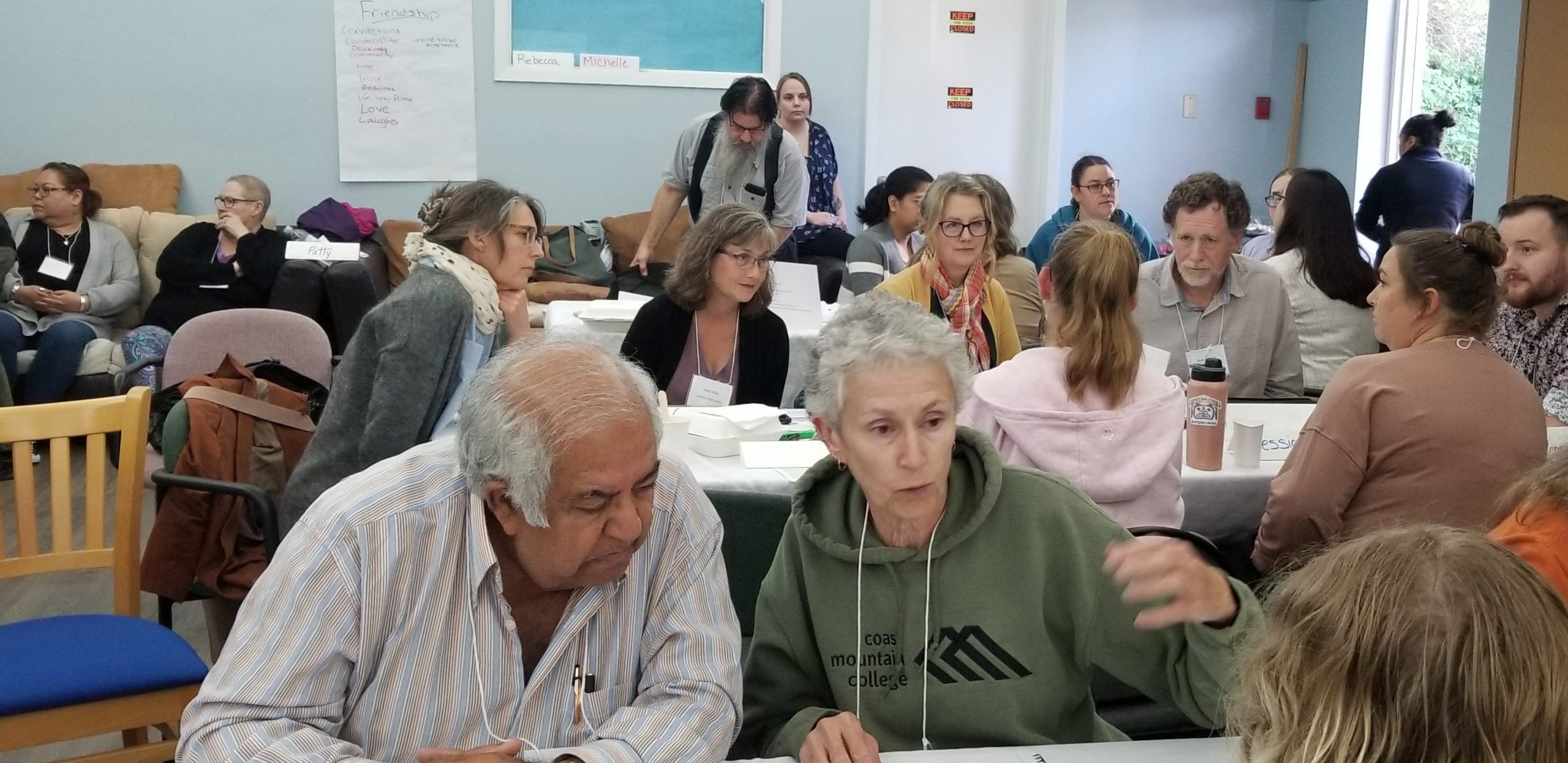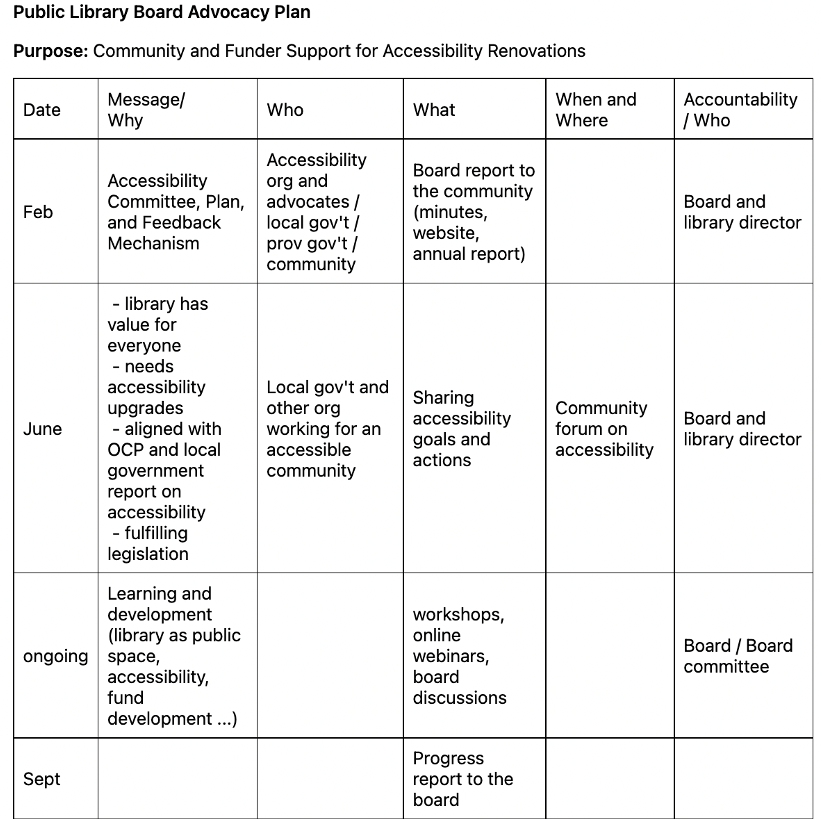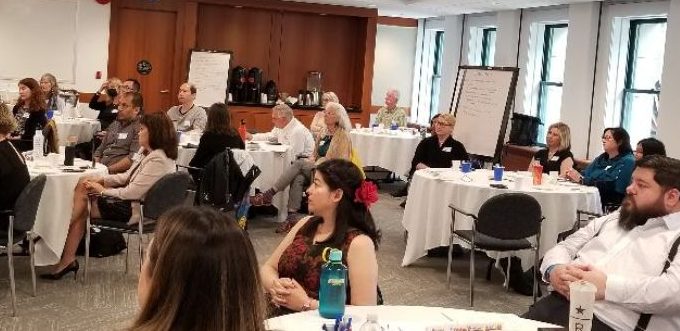Advocacy is frequently used as a catch-all or general term for approaches or actions that might result in a benefit for an organization, such as the public library. Increasingly governance discussions and not-for-profit literature are pointing to a need for boards to be specific about what they mean by “advocacy” and to consider focusing on other approaches such as developing trust-based relationships and credible influence with allies, partners, funders and all community members to bring about an outcome or change that benefits their public library, and importantly their community.
On this page we will briefly discuss relationship building, influence, and advocacy. See below for a list of resources to support your board discussions and planning.

Relationship Building
Public library trustees have a unique opportunity to build relationships with community members, organizations, funders, and municipal, regional district, and First Nation governments for the public library. Trustees volunteer with other organizations in the community, own businesses, and may work for or be elected officials with municipal, regional district or First Nation governments. These connections can support the board with taking the first step in forming a long-lasting and mutually beneficial relationship with individuals, organizations and government.
The key to these relationships is that they are built with trust and are about developing an understanding of what is important to each other; sharing common interests in the needs and aspirations of the community; and supporting each other to be of service to the community. Through these relationships the board understands the community better and the value of the public library in the community.
When a board is involved in relationship building, other areas of board work such as the oversight of policies and strategic outcomes are more closely aligned with the needs of the community. These relationships may also support the board’s influence and advocacy goals.
In building a trust-based relationship with community organizations, municipal, regional district and First Nation governments the board may want to ask themselves the following questions and set aside time for the suggested Relationship Building Board Discussion Prompts:
- Where are we now in our relationship?
- What do we know about them?
- How transparent and accountable are we to the community and funders?
- How do we support their goals and aspirations?
- Do we meet? How often? What do we discuss?
- Are we or they at ease in reaching out with a question or an invitation?
2. Where do we want to be in our relationship?
3. What are the one, two, or three things that we can now and over the next few months to build and nurture a trust-based relationship.
Relationship Building Board Discussion Prompts (September 2022)
Building Trust with Transparency and Accountability (September 2022)
Influence
Every issue, discussion, or decision has influencers. Influencers are not necessarily directly part of decision making, but they are part of conversations, meetings, local media, and other ways of influencing decisions.
While building strong trust-based relationships with community members and partners is not about gaining the support of influencers, those trust-based relationships will result in others better understanding the value of the public library and being better able to champion the public library with decision makers such as municipal, regional district, and First Nation governments.
Advocacy
Effective advocacy is planned, adaptive, deliberate, and sustained.
Planned
The board’s intention to advocate for the library needs to be documented. Documentation is important for transparency, accountability, and continuity. The plan states the desired outcome or change such as increased government funding for operations, donations for a building project, or a change in law or legislation and includes the why, who, what, where, and when of all the advocacy actions. Actions include further documentation such as reports to the board and to the community.
As seen in the example below, the plan does not need to be elaborate.

Adaptive
Change is inevitable. Scan the public library’s environment for changes in government, the local economy, legislation, new potential partners or funders and be prepared to change the plan to achieve the outcome.
Deliberate
While some advocacy moments, such as being seated next to the Mayor at an event, are by chance the overall advocacy campaign or plan is not left to chance. Know the why, where, what, and who and be prepared to talk about your library’s value, impact on the community, vision and goals.
Sustained
In the enthusiasm of advocacy planning it is easy to over commit or to underestimate the need for support and resources. Be frank about the board’s current capacity and commitment and be prepared to scale the plan to what can be sustained now while building momentum for advocacy.

Governance and Relationship Building, Influence, and Advocacy: A framework for thinking it through
The Governance and Relationship Building, Influence, and Advocacy: A framework for thinking it through encompasses the idea that some of the most important work you do as trustees is building relationships, influence, and advocacy.
Why a framework?
We have chosen to call this a framework because we know at BCLTA that each of you are working within a unique set of circumstances (geo-political, social, economic, library size, budget, library type and so on). A framework is flexible and suggests ideas and approaches that along with your knowledge of your community, your board, and your library, you can use for successful relationship building, influence, and advocacy.
Resource List
This list is just a start and will be better with your recommendations. Send recommendations to babs.kelly@bclta.ca
Library World
We are the national voice of Canada’s library associations. Our purpose is to:
- advance library excellence in Canada;
- champion library values and the value of libraries; and
- influence national and international public policy impacting libraries and their communities.
Alberta Library Trustees Association
Saskatchewan Library Trustees Association
Ontario Library Association
- Advocacy
- OLA has a VIP approach to advocacy: help members demonstrate the Value of libraries, Influence decision making, and positively Position libraries, and the people who work for them.
- The Ontario Library Board Association is a division of OLA.
Library Advocacy Unshushed
Become a powerful advocate for the values and future of libraries and librarianship. Be informed, strategic, passionate, and unshushed.
- Free, archived EDx course.
American Library Association
- Advocacy, Legislation, and Issues
- Advocacy University
- Library Advocates Handbook
- Frontline Advocacy Toolkit
United for Libraries
- An Association of Library Trustees, Advocates, Friends and Foundations (Division of ALA)
- Citizens-Save-Libraries Power Guide
Board & Community Development
Board Source (U.S. focus)
- B.C.’s local government information hub
- Social and Planning Research Council of B.C., 2013
Government of British Columbia
Minnesota Department of Health
- Building Community Relationships (see section “Benefits of Community Engagement”)
- Tools and training for collective impact, community engagement, collaborative leadership, and evaluation.
Vantage Point
- Advocacy: An Essential Practice for Mission Impact
- Forces for Good: The Six Practices of High-Impact Nonprofits by Leslie R. Crutchfield and Heather McLeod Grant.
- Advocacy 101 (workshop)
